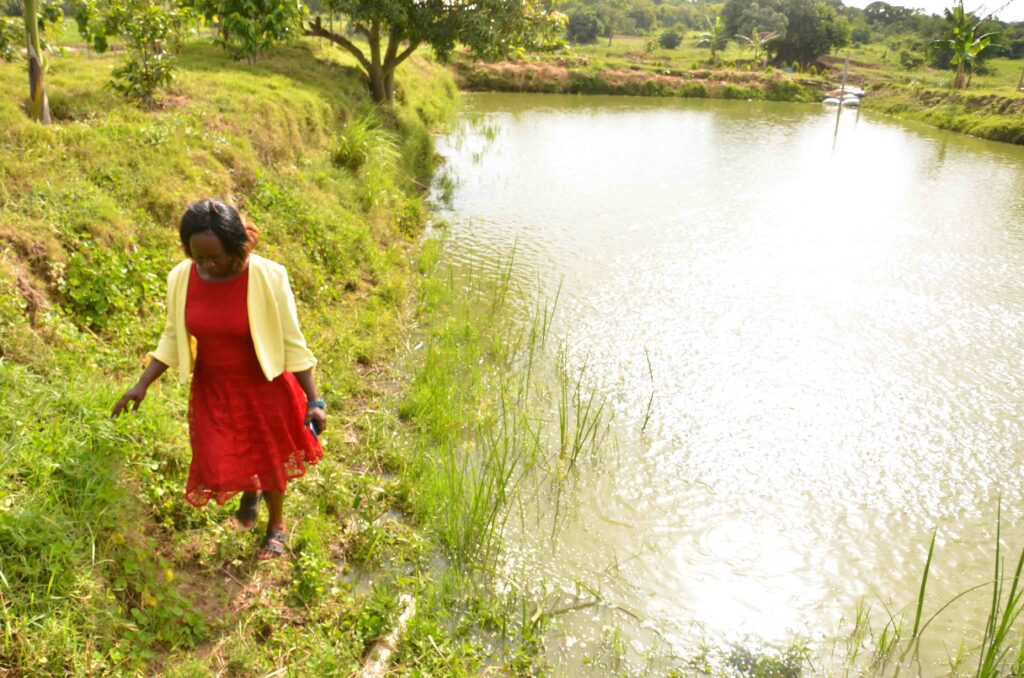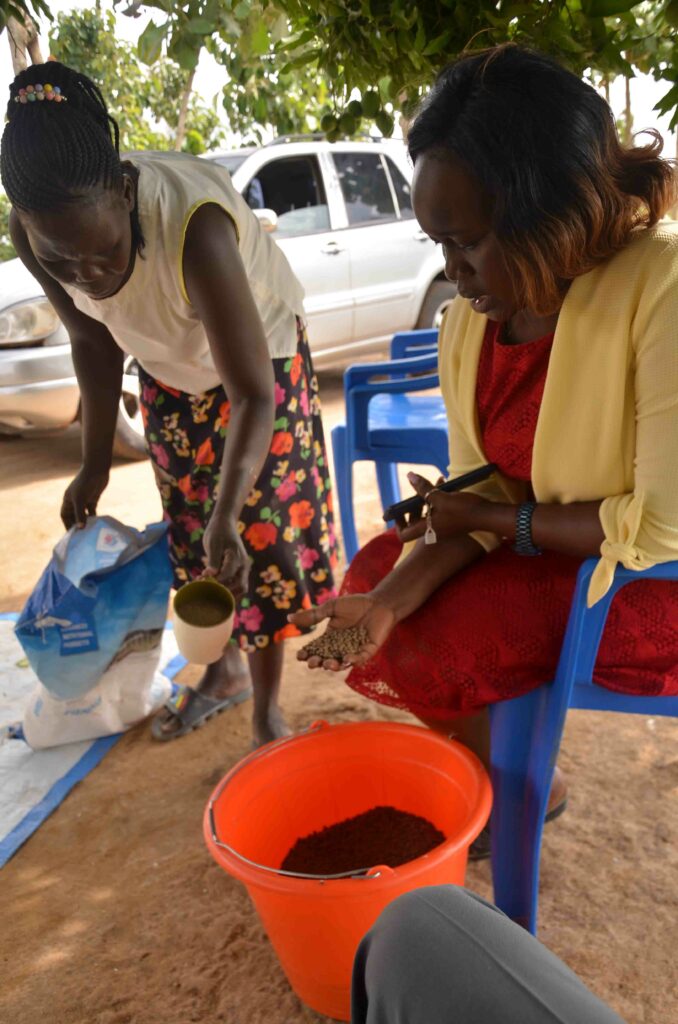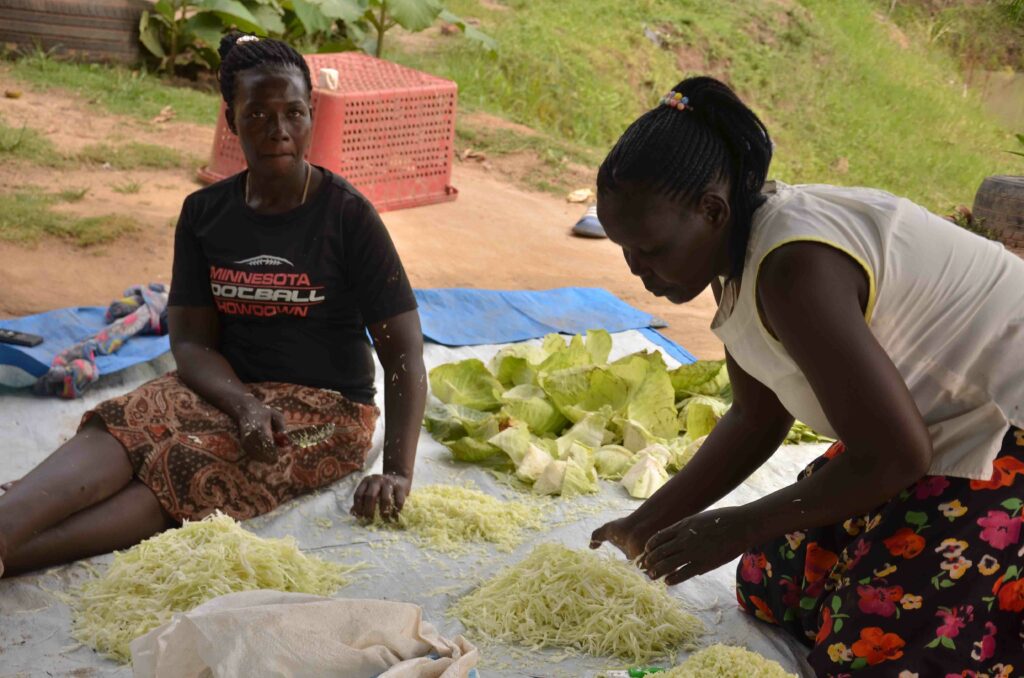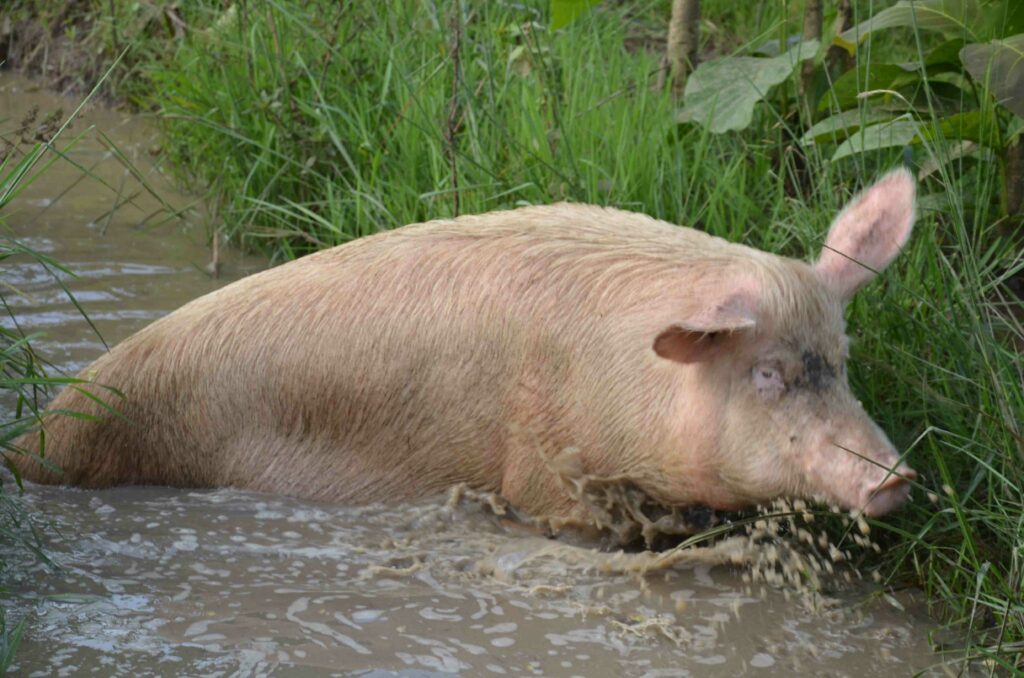By Patrick Okino
Five years ago, Fiona Birungi Acayo, and her husband, Fred Felix Owilo, had no interest in venturing into fish farming as a potential source of generating income.
But they were inspired to start the venture when they were making bricks for construction of their house at Amuca, Lira City West division, Lira City in 2019.
“We were building and opted to make our own bricks to reduce the cost of construction,” she says.
She said whenever they could dig a portion of their land to get soil to make bricks, water would fill up the pit surface since it was a swamp.
“Every time we would get there, most of the places we dug the previous day had been filled up and we started thinking on what to do to fight this water. The idea of starting fish farming came from my husband,” says Acayo who is a lawyer by profession.

Starting the project
Straight away Acayo and her husband started the journey in 2019 with a small fish pond measuring 10 by 10 square meters. The couple bought 350 fingerlings worth sh70,000 from Lira Integrated School Fish Farm and dropped them in the hole.
“It was not a well-constructed pond but a big hole where we got the bricks from and the fish performed well,” she said.
She says on seeing the positive results, the couple added three more fish ponds.
They named their enterprise Dewilos Fish farm and Acayo is the Chief Executive Officer.
Acayo constructed three more ponds in 2020. In 2021, she added 11 more ponds and six others in 2022. By the end of 22, the farm had 21 ponds.
The farm has two varieties of fish, catfish and tilapia.

Feeds
Acayo says they buy feed from Kampala at the cost of sh120,000 per bag which weighs 60 kilograms and, in a month, they use 30 bags.
“We used to spend a lot of money on feed but now we have reduced it since we developed a new innovation,” she added. The farm is now processing their own feeds.
“We are now making our own feeds to reduce the cost because before we could spend sh800,000 weekly on feeds alone,” she says.
She said fish farming has been in Uganda for long but people have not taken it seriously and, therefore, there is no specific area where people are making quality fish feeds.
“Most of the fish feeds are being imported. The local feeds in Uganda are of poor quality,” she said.

Farm expanded
She says availability of water, proper management, man power, funds, support from microfinance and relationship banking institutions pushed them ahead.
She added that other institutions which contributed to the expansion of the farm include platinum, housing finance bank and national social security mid-term savings.
Access to inputs like fingerlings, feeds, and affordable raw materials such as soybean, maize bran, sunflower cake, cassava and silver fish are also a major boost, Acayo says.
The manpower to construct the ponds, Acayo says, were community members. She calculates that the farm has invested over sh10m to set up the ponds and buy fingerlings.
Market
In the 21 ponds, according to Acayo, maintains over 50,000 fish (catfish and tilapia) at different growth stages.
Her market includes the local community, hotel owners and vendors in Lira City.
Acayo says she sells a kilogram at sh8,000 and on a daily basis she earns between sh300,000 to sh400,000 from fish sales.
Impact to community
Acayo says there are many community positives created by establishing the farm in the area and among them include providing employment, improving household income, protecting the environment and ensures it’s not destroyed, people learnt to construct fish pond and they have stocked them.
“Besides the construction of fish ponds, they have also learnt how to mix or prepare feeds,” Acayo said, adding that schools are also bringing their students for study tours and practical learning.
Community members also seek training on farming free of charge including those coming to the farm to learn.
“We encourage and support whoever wants to start fish farming like for the last one year we have seen five families constructed fish ponds in our neighbourhood and stocked. It is not by coincidence but they learned a lot from us, prompting us to venture into the business,” Acayo said.
The availability of fish, Acayo adds, has helped improve the nutrition of community members as they.
Achievements
The farm is a five-acre piece of land Acayo said as a result of the farming, they have acquired more land to expand the farm, increased the family wealth and educated their children.
“Now we have expanded from fish farming to piggery, black solder fly farming and soon we are moving to poultry,” she added.
Challenges
Acayo said access to feeds, drought, thieves invading fish ponds at night are still some of the challenges noted.
“It is true that we have started making our own feed but it is not enough to run the farm prompting us to outsource from the market,” she said.
She said though the project is near the water source, during the dry season, some of the source tends to dry up and they lose the fish.
“In 2021, the farm was hit badly by the dry spell, the ponds almost dried up but we bought the pumps and managed to pump water from the nearby source,” she added.
About the theft of the fish, Acayo said some of the neighbours used to invade the fish pond at night with the fishing nets and pick them for their food.
Ensure bio-security
Acayo said she has employed two security guards to protect and secure the farm against thieves after experiencing some wrong elements invading the ponds at night.
“Before I recruited security guards those days when the fish were ready for sale the neighbours could invade the ponds at night and steal,” she said.
“They targeted (fish) for their food. They could come at night with the fishing nets when we are sleeping and start fishing but when we noticed we recruited guards and it was stopped,” she added.
She says she has also fenced the farm with iron sheets to prevent predators like monitor lizard, tortoise, snake, from entering the farm.
“We have also installed security cameras,” she said.
Farm to remain afloat
She said they are in the process of registering the farm as to ease managing, activities, ownership, and management.
“Even after life, our family members are to be shareholders to keep the legacy and manage the farm in case we are not there,” she added.
Innovations
This year, Acayo shifted the focus into growing more fish from the existing fish ponds and ventured into other enterprises, like piggery whose waste is raw material for fish feeds. They also grow black soldier flies.
“It is one of the best converters of animal waste and food waste into proteins which are used to feed fish, pigs and domestic birds (chicken, darks, turkey),” she added.
She says they use waste from pigs and the kitchen to feed the black soldier flies which produces larvae that are used to feeding chicken, fish, and pets among others. “This has helped in reducing the cost of feeding in the farm,” she explained.
Expenses
Acayo has employed 17 workers on a permanent basis specifically to give feeds, keep the farm clean, prepare feeds and also take care of piggery. Each of the workers is paid sh300,000. She spends sh3.6m on feeds monthly and sh3m in buying ingredients to prepare feeds.
Felix Owilo, Acayo`s husband said they identify youth with clean record though the help of the community and make ensure they are properly paid and their welfare is properly looked into.
“We don’t bring in those with criminal records because our farm is still growing and in the near future it will be among the biggest farm in northern Uganda,” he said.
Risk associated
There are so many risks in fish farming according to Acayo but good enough most of them can be mitigated.
She identified some of the risks, poor water quality as fish needs very clean water with enough oxygen and security especially people who might come and steal.
“Sometimes it rain heavily and we run the risk of the fish pond being swept off and we loss all the fish, “she said,
To ensure good quality water, the farm has a reservoir which is used to replenish water keeping it fresh.
She says she has also installed a water fountain system that sprays water in the air and in the process, it absorbs dissolved oxygen from the air and re-introduce it in the fish ponds.
To mitigate flooding, Acayo says they have installed overflow pipes to drain out the excess water in the ponds.
Mistakes made; lessons learnt
Acayo says they made several mistakes and one of them is mixed sex fingerlings, which made fish take a long to grow yet if it was single sex it would grow fast.
“We are now buying the single sex fingerlings from the hatcheries that specialize in producing male fingerlings,” she added.
Their first ponds were constructed poorly as they did not have strong bunkers and when rain came it collapsed and they lost some of the fish during heavy rain. To mitigate a further occurrence, Acayo said, they moved to using sandbags to re-enforce and construct the bunkers to fortify the ponds.
At the start, Acayo did not pay attention to the stocking and put both tilapia and catfish in each pond. She explains that they learnt that mixing catfish with tilapia was a big mistake and in the subsequent fingerlings stocking they separated.
They started with imported feeds which were costly. To manage this, they resorted to making local ingredients.
“Currently we are growing our own black soldier flies whose larvae are used for making feeds,” she added.
She says for other ingredients like groundnuts, soya, maize, bran, millet bran, sunflower seedcake and silver fish used to make the feeds are bought in the local markets.
Family participation
Acayo says her husband, Owilo, helped her in funding the farm, supervising and also helping in training workers.
Her children, according to Acayo during holidays, help in feeding the fish and black soldier fly larvae, including some of the relatives.
“They come occasionally to help in the slashing, weeding, cleaning around the compound, feeding fish and preparing feeds,” she added.
Piggery project
At the farm, there is also piggery (large white) in the farm located five kilometres West of Lira City along Lira-Kampala highway.
She says, through earning from fish farming, they started piggery projects in March 2021 with only three piglets but since then it has progressed.
“Our plan is to have 100 pigs but at the moment we have 60,” Acayo says, adding that they have 20 piglets and they give out at sh200,000 and mature one between sh800,000 to sh1m.
According to Acayo, for one to venture into piggery projects, one should have capital, skills to construct a piggery house, feed and source of water.

Plan
She says they are striving to establish a fish hatchery in the farm to be one of the biggest fish farms in northern Uganda and procure the machine to increase water supply in the farm.
She says they also plan to increase the number of fish ponds from the current 21 to 50 and boost the number of fingerlings to reach 150,000.
She says they are planning to build their website to attract both national and international markets in the near future.
What others say
Eunice Ameri, a neighbor, said the farm has impacted positively in the lives of many people in the area and the majority are digging up fish ponds.
He said they never took it seriously when the project was starting but later started picking a lot of interest because shortly it created employment to the young people around the village.
“We didn’t know, it was a serious project and as I speak now they have about 21 fish ponds stocked with 60000 fish,” she said.
She said she has also acquired knowledge to start fish farming but she was still looking for the capital to kick off with the plan.
“Beside impacting knowledge to start fish farming, they also distributed tick trees to the community to protect the environment,” she said.
Ameri identified one of the community members as Bosco Okello who had constructed fish ponds and had started venturing into fish farming.
Walter Okabo, the LC1 of Areco Cell, where the project is located said it has created jobs for a number of redundant youth in the area and equipped them with skills.
“One of my brothers, who worked there, generated money and later constructed a permanent house. This was not going to be possible without the availability of the farm,” he said.
He said a number of youths come as far as Dokolo district to acquire skills on fish farming, piggery and also get jobs.





